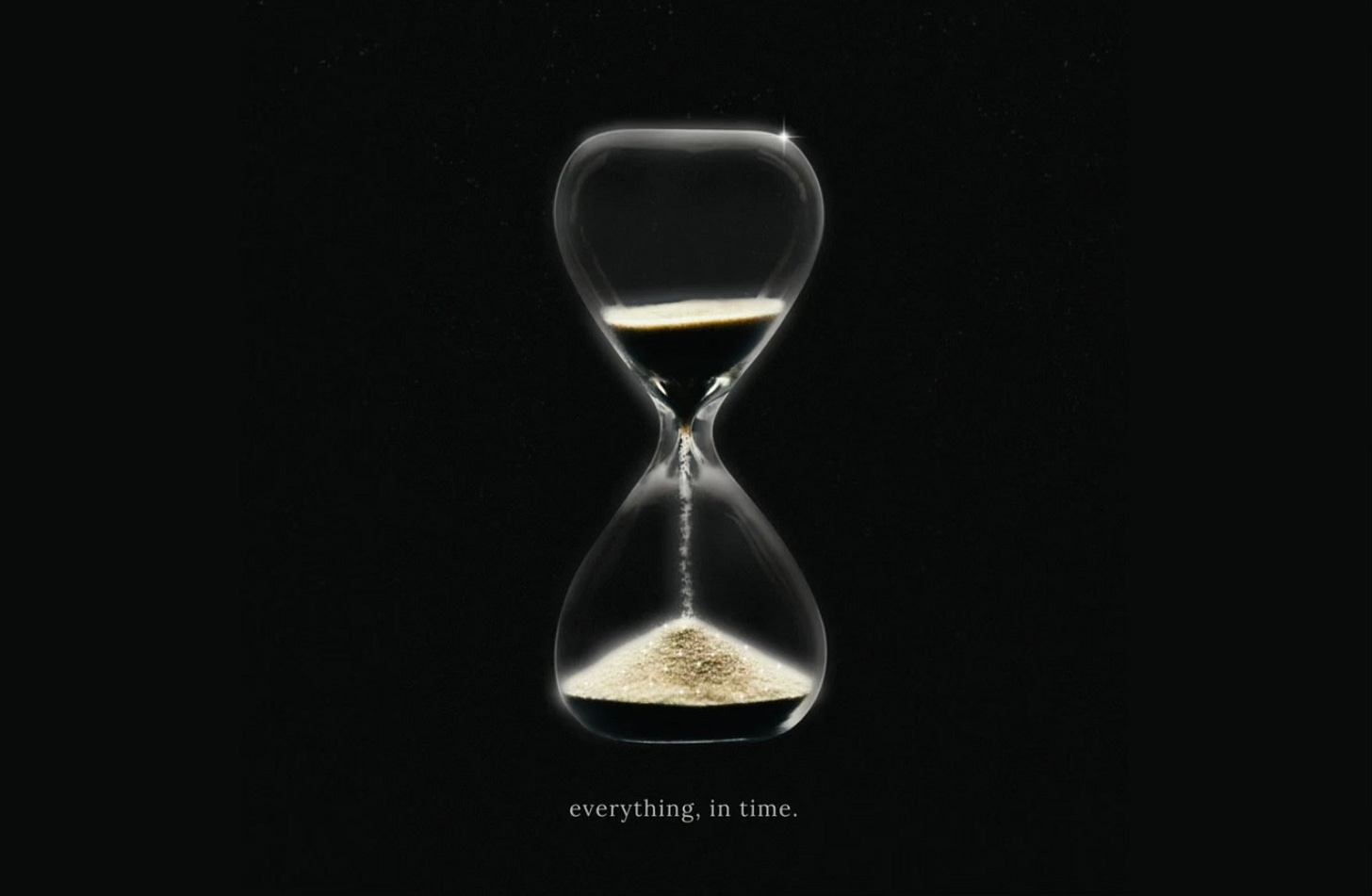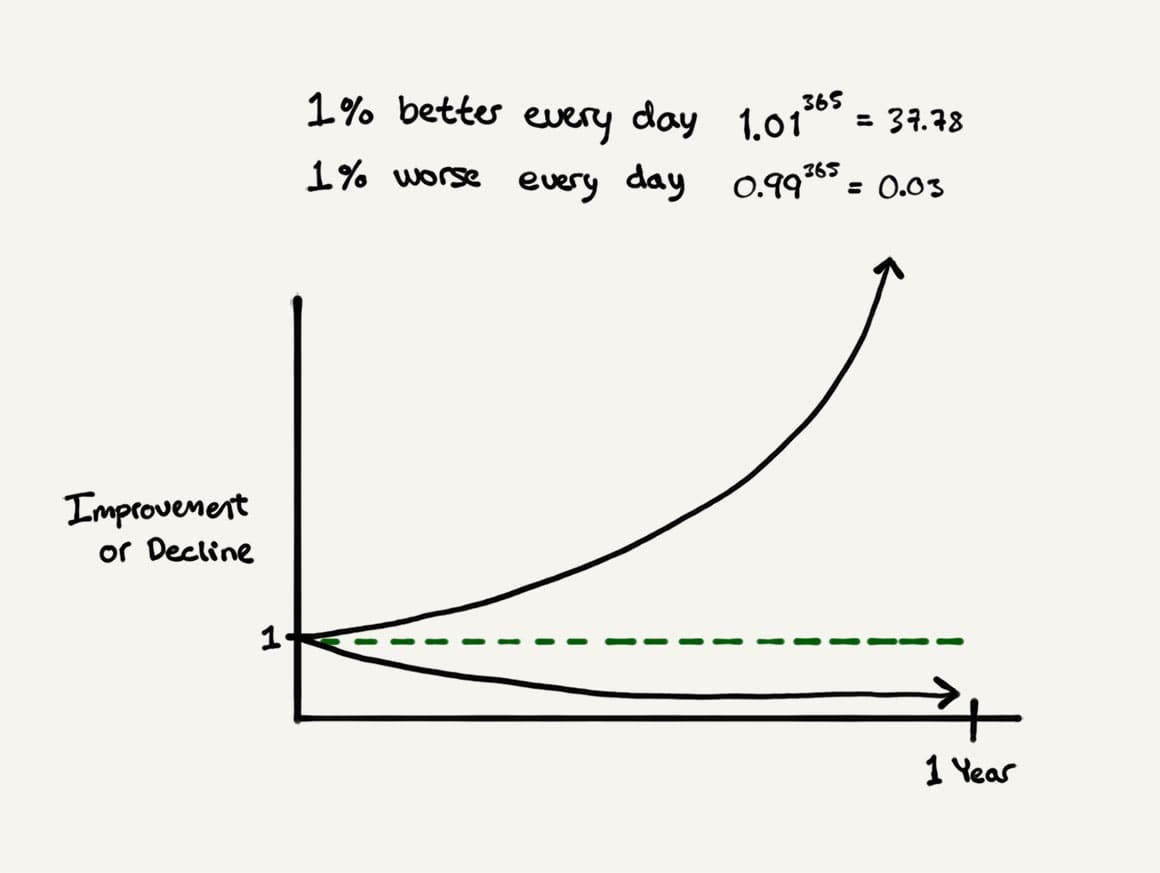Joy of Compounding
Episode XVI. Block height: 844000. Everything, in time. Compounding is key because human time is scarce.
Time is the scarcest asset for living beeing, and compounding is the concept to value your limited life time appropriately. Most people associate 'compounding' primarily with money and finance, or, to be more precise, with interest on capital, thus earning returns on both your original investment and on returns you received previously. However, the concept of compounding is much broader and can be applied to many situations in life. I see it more as a concept of aligning time in your favor. The longer you compound, the more impressive the results are. Bring time to your side, and life won’t be a hassle. This is what this episode is all about.
Start Small
First and foremost, one small step at a time in the right direction can change your whole life. The difference between those who fail and those who succeed is their courage to act repeatedly. Most people, when faced with change, however, will feel at least some element of fear getting in the way of actually making the change. The idea is to make small, continued changes so that your brain doesn‘t even realize that you are trying to change and doesn‘t get in the way. Start by asking small questions, by thinking small thoughts, by taking small actions, by solving small problems, and by recognizing small changes. Try to become 1% better every day. With compound interest on those small changes, they become exponential over time.
The idea is to make the change simple, habitual, and fun. Small steps make delaying gratification easier and more sustainable. So, whether it is quitting a bad habit or forming a good one, the idea is to start small and then build over time. If we are facing in the right direction, all we have to do is keep on walking. Here are some areas where compounding offers huge upside and limited downside.
Compound Health
First and foremost: One life, one body; take care of it, otherwise nothing else will matter. The problem with being healthy is that you only realize it when it's already too late. The human body is a miracle of nature. It can take a lot of abuse. However, once a limit has been crossed, things happen very quickly. That's why it's all the more important to do small acts of kindness for your health every day. Eat whole foods and skip processed garbage. Exercise daily, even if it is just a 10-minute walk. Incorporate physical activity into your daily life. If possible, go by bike to work and have resistance bands at the office. Small acts of daily physical activity can change your life significantly over time. If you focus on daily exercise, whole-food nutrition, and about eight hours of sleep a day, you will be rewarded with a longer and healthier life. Improved health improves everything and makes every experience more enjoyable, at every age. Thus, compounding good health is the basis for everything else.
Compound Knowledge
However, regardless of how well you preserve your body, it will deteriorate over time. Thus, the body is limited in ways that the mind is not. In fact, by the time most people are fifty years old, their bodies begin to weaken, but the amount of growth and development that the mind can sustain has no limits. Become a learning machine. The more you read, the more you build your mental repertoire. Incrementally, the knowledge you add to your stockpile will grow over time as it combines with everything new you put in there. This is compounding in action, and it works with knowledge in much the same way as it does with interest.
The best and most inexpensive way to compound knowledge is through books. The more you read, the more you build your mental repertoire. Creating a habit to read daily is the greatest life hack I have discovered. Books are truly life-changing, particularly once you have developed the habit of reading every day. The neuronal connections that compound through the effort will make you an entirely new person after each and every page.
I hear you scream: „Yea I get it Bro, but I have no time!“ I always hear that people have no time to read books. It always seemed strange to me. When you work full-time and maybe have a spouse and children, time is scarce. However, the average person spends two hours a day watching television, an hour commuting, and another two hours a week shopping; that adds up to twenty-three hours a week, or 1,380 minutes. That is a fucking lot of time! If you read 30 pages each day, that’s 7,300 pages a year, or roughly 30 books. And each single one of those books has the power to change your thinking and your life significantly.
By the way, you don’t have to buy physical books; if you are more of an audiophile, just get audiobooks or listen to podcasts. You can even listen to them if you are in your car driving to work, on the tram or while you work out. So don't tell me you don't have time to gather knowledge. And if a book does not interest you, you just abandon it to save time and move on to something more interesting. Reading multiple books simultaneously, quitting those that are not engaging, and constantly picking up new ones is the Antifragile approach to self-education. Just try to wake up every day a bit wiser than the day before.
Hang out with people better than you
Surrounding yourself with smarter and better people provides a great education. You gain firsthand experience of their thought process, how they prioritize, their value system, how they live each day, how they handle success and failure, and many other important things that textbooks cannot teach you. If you are the smartest person in the room, you are in the wrong room. It's wiser to surround yourself with smarter people and feel uncomfortable than to limit yourself to a mediocre circle just to feel comfortable. You are, after all, the average of the five people you associate with the most in your life. Learn from others because knowledge comes from experience, experience often comes from failure, but it doesn’t have to be your own failure.
Compound Positive Thoughts
Knowledge is important, but what does it matter if you are depressed and unhappy? Therefore, compound positive thoughts. Compounding positive thoughts generates the consistent energy we need to reach our long-term goals. Our mind automatically generates thoughts related to the information we consume. Your mind is like an empty glass; it will hold anything you put into it. If you put sensational news, negative headlines, talk show rants and mainstream media in the glass, it is no surprise that you get dark, dismal, worrisome water, and everything you create in your mind will be filtered through that muddy mess. However, if you read good books, talk to interesting people, and be generous to others, your water will be clear. Thus, be conscious of your information diet. When you change the way you look at things, the things you look at change. If you form the habit of looking for the positive, you will find it in the smallest things around you, and your mind will fill it with happiness.
“Men are disturbed not by things, but by the views which they take of things.“ - Epictetus
And i know it is way easier, as said. Especially because how we perceive the world, positive or negative, is in some parts predetermined. Studies showed that about 25% of it is due to our genetic composition. So for some people, seeing the positive in life is more difficult than for others. However, this is also very encouraging because we can work on 75% to live a better and happier life, regardless of our predisposition. A very powerful fact is that the human brain can only hold one thought at a time. Think of it: you can either hold a positive or a negative thought, you can rewrite instantly a negative one with a positive, and vice versa.
One habit that helps me to establish a more positive mindset is to practice gratitude. Gratitiude is, in fact, the most effective path to finding contentment. If you need to wake up early as a parent, for example, be grateful to have children. I try to be grateful for three things in my life when I wake up and before going to bed. Another one is meditation. I can’t emphasize this enough: Learn to meditate. When you train your mind to focus on something as simple as the breath, it also gives you the discipline to focus on much bigger things and to tell the difference between what is important and everything else.
Compound Character
The only person you need to be better today is the person you were yesterday. There is no superiority in feeling superior to your fellow humans; true nobility is being superior to your former self. Thus, competing with others makes you bitter, competing with yourself makes you better. People who constantly strive to improve themselves usually have a role model. As creatures of comfort, we are reluctant to step out of our comfort zone, and we often lack the inner urge. Because many of us are motivated by examples, however, we come to realize that the drive to improve can be driven by others. Role models can act as our motivational coaches and as a source of daily inspiration in our lives. Start writing down the virtues you value in others and re-reading them once in a while. Because in the end, you character becomes what you are thinking continually.
Be humble
Humility is the gateway to attaining wisdom. Maybe you discovered it yourself, but the deeper one dives into any field, the more humble one becomes. By demonstrating intellectual humility and acknowledging what we don’t know, we place ourselves in a beneficial position to learn more. We cannot know everything, but we can work hard to become just about smart enough to make above-average decisions over time. If you are humble, truly happy and satisfied with the life you are living, you will be happy to see other people succeed. Don’t make this life all about you. Be happy when other people are doing well, and encourage their success.
Compound Finance
Truth is hard to assimilate when it is opposed by interest. You cannot really understand how the world truly works unless you have financial independence. Once you achieve this state, it changes everything. It enables you to look at reality in a truly unbiased manner. Aim to achieve financial independence at the earliest possible time. That is when you will start seeing the world as it really is. Because it is very difficult to think and act long-term unless you are financially independent.
To be clear, financial independence does not mean that you don’t work, but just you don’t need to. The goal of financial independence is to stop depending on others (bosses, clients, a schedule, a paycheck). True wealth is measured in terms of personal liberty and freedom, not money. Money alone does not signify independence; control over time does. The only definition of success is being able to spend your life in your own way, and on your own terms.
Of course, you ask yourself, how can I achieve this? Underspend your income to the maximum extent possible but not save you to death. Beware of little unnecessary expenses; a small leak will sink the greatest ship. Avoid taking on any debt for discretionary consumption. Learn to cherish frugality. Always pay yourself first by learning new skills or buying new books. Spend on yourself only what is left after you have made an investment. Never depend on a single source of income. Invest at least a small amount of your income regularly and over a long period of time, making use of compound interest. And remember, money represents freedom and independence, not a means to engage in consumption. The most important reason for saving is personal freedom and control over time. Freedom is like income that cannot be taxed.
Society glamorizes a consumption-laden lifestyle, and most people follow this path blindly, spending on non-necessities that drain earnings, leaving little in the form of savings. The journey to financial freedom starts with the first money saved. It is not the first million that is the hardest; the most difficult part is getting started. Clawing your way out of debt to achieve a net worth of $0 is much more impressive than saving the equivalent sum, because you don’t have compound interest helping you out.
Long term thinking
When you focus on long-term outcomes, expect to be frequently misunderstood in the short term. We gain an advantage over time by staying intellectually honest while studying new ideas and only investing in the few which we think the odds are significantly in our favor. If everything you do need to work on a three-year time horizon, you are competing against a lot of people. But if you are willing to invest on a seven-year time horizon, you are now competing against a fraction of those people, because very few people are willing to do that. Thus, just by lengthening the time horizon, you can engage in endeavors that you would never otherwise pursue. The short-term mindset that is all-pervasive in the market creates irrational buying and selling for all sorts of reasons that have everything to do with the short-term direction of the asset but nothing to do with its long-term value.
The longer you can extend your time horizon, the less competitive the game becomes, because most of the world is engaged over a very short time frame. The path to lasting wealth is deferred gratification, savings, and compound interest. Develop the habit of saving in such a way that you enjoy your present reasonably well and also ensure a bright future tomorrow. Being content in life and having fewer needs enables you to be happy in any situation. By the way, wealth, in fact, is what you (and governments) don’t see. It is the cars not purchased. The diamonds not bought. The renovations postponed, the clothes forgone, and the first-class upgrade declined. It’s assets that haven’t been converted into (unnecessary) stuff. It‘s Bitcoin in self-custody, a far cry from state arbitrariness.
Hedonic Treadmill
We want what we want until we want some more. A process called ‚hedonic adaption‘ determines that we quickly become accustomed to most things in our lives. As a result, experienced happiness is often fleeting. Modern slaves are not in chains, but in consumer debt.
„We often buy things we don‘t need with money we don‘t have to impress people we don‘t like.“ - Dave Ramsey
The solution, particularly after basic needs are met, is to actively seeking contentment with what you have. That doesn‘t mean you should stop saving, stop putting effort in, or stop sacrificing. It means you come to terms with the idea that the outcome isn’t a fountain of happiness. So if you are going to grind, you better damn well enjoy the process. Never measure life by your possessions, rather measure it by the hearts you touched, the smiles you created, and the love you shared. Love people and use things, because the opposite never works. Love is caring without an agenda. Love isn‘t something we fall into; it is someone we become.
Compound Experiences
To avoid ending up on the hedonic treadmill, where your expenses for things rise with your income, you can start compounding experiences instead. Once you get past the point of working for basic needs and have invested a considerable amount, you can start to exchange your labor for positive life experiences with yourself, your friends, and your family. Therefore, invest in experiences that yield long-lasting memories. Always keep in mind that everyone’s health declines with age, meaning that with age 80 you won’t be able to spend time with your parents because they are most likely already dead, nor are you enjoying traveling as much as you would with age 30.
Learn to balance current enjoyment with later gratification because, in retrospect, your life is the sum of your experiences. Many psychological studies have shown that spending money on experiences makes us happier than spending money on things. Unlike material possessions, which seem exciting at the beginning but then often depreciate quickly, experiences actually gain in value over time: They pay you a memory dividend. When you are too frail to do much of anything else, you can still look back on the life you have lived and experience immense pride, joy, and the bittersweet feeling of nostalgia. And that is exactly what I mean by a memory dividend. So every time you remember the original moment, you get an additional experience from mentally and emotionally reliving the original experience. The earlier you start, the more compound effect you have. And a lot of memorable experiences do not cost you a lot of money.
Conclusion
The rich have money, the wealthy have control over their time, and time is the scarcest resource humans possess. Make the most of your scarce lifetime and start compounding health, knowledge, positive thoughts, experiences, character and finances to become a better and more happy person over time. One percent better each day over a long period of time will lead you to outstanding results. Day one, or one day? It’s your choice.
The End
That's it for this episode. I hope you gathered some valuable knowledge from this one. Thanks for reading, and see you in the next one. Until then, remember: Time is scarce; make it work for you; compounding is key.
₿ critical, ₿ informed, ₿ prepared. Yours,
Not your keys, not your coins
Get yourself a proper hardware wallet: Shiftcrypto’s The BitboxBitcoin only is my favorite. Swiss made, Great customer support and worldwide shipment.
Education for everyone
Pure, independent and free education. If you want to support my work, you can donate Sats via Lightning. I truly appreciate it!
Education is key
[1] Ryan Holiday, Discipline is Destiny
[2] Guatam Baid, The Joy of Compounding
[3] Richard Meadows, Optionality
[4] Maxwell Maltz, Psycho-Cybernetics
[5] Bill Perkins, Die with Zero
[6] Ryan Bush, Designing the Mind
Related Topics
Optionality
If you want to become antifragile, survive and thrive in a volatile world, you should discover the concept of OPTIONALITY, capping your downside and leveraging your upside. This is what this episode is all about. Fasten your seatbelt and let us dive straight in.








Amazing read, wise and sound observation/advice that I will be reflecting on for some time, big up !
Great read 📚 lots of knowledge passed on to readers. Keep up the good content.